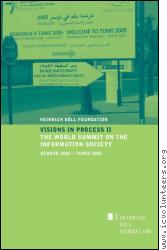A laboratory for new mechanism: Volunteerism as a building block for multi-stakeholder approaches (MSAs)Click to Download visions_in_process_ii.pdf (3.8M) 16 November 2005 © Heinrich Boell Foundation, Visions in Process II, The World Summit on the Information Society, Berlin, Germany IntroductionTo many, the World Summit on the Information Society (WSIS) process has been a laboratory: Its innovative mechanisms hold the potential to serve as effective models to help shape future UN meetings and summits, as well as other processes involving multiple stakeholders. In order to realize this potential, it seems critical to step back and to evaluate the achievements of WSIS, both in terms of its success in attaining its original objectives, and its potential for structural replication elsewhere. While it is premature to draw final conclusions regarding the WSIS process, this article outlines some initial findings on the structure of the meeting and overall success in implementing its recommendations and policies. In the second part of the article, we describe some positive results stemming from the active participation of one specific constituency, the volunteer sector. The volunteer sector first became involved in the process of the WSIS in 2002, at the African Regional Conference in Bamako. Since then, volunteers and volunteer organizations have actively contributed to its preparatory process, the Geneva summit, and the Tunis phase. We conclude that some of the lessons learned in the volunteer sector are particularly relevant to future efforts to build both effective multi-stakeholder relationships and successful partnerships. At the end of this paper, we detail the unique qualifications of volunteers to impact these processes. Contents Ways forward and challenges ahead of usThe very essence of volunteerism is also the underlying human dimension and force of what we call Information Society. The word "volunteer" comes from Latin vol+ens, meaning free+will. A volunteer is thus driven by his or her free will. As such, the concept of volunteerism touches on the very essence of individual motivations of human beings and groups to achieve goals. This was the recipe that made the International Year of Volunteers a success, and allowed the Global Polio Eradication Initiative to mobilize ten million people to vaccinate 550 million children in the year 2000. This is also what drives the open source community, creators and publishers of web contents, and so on. For volunteerism to be successful, it needs to be always based on an exchange, a multilateral relationship. In a similar way, multi-stakeholder processes and Public Private Partnerships (PPP) cannot succeed if they are based on unilateral principles. Because different sectors are driven by different motivations, there is the need for a more genuine understanding by each stakeholder group of what the other party expects and would like to get out of the equation. Therefore, I believe MSPs could actually draw on and benefit from some of the experiences developed in the volunteer sector and the driving force of volunteerism: Free will, the fact that one is doing something not out of obligation but individual or collective choice. For volunteerism to actively contribute to the construction of multi-stakeholder processes, it first needs to be understood better. There is a need to acknowledge that the scope of volunteerism is much broader than is often understood and goes well beyond the common stereotype of cookie baking. Volunteerism includes social activists, open source software programmers, and others making very real impacts on social, political and economic levels. It is an essential factor in turning youths into active citizens of tomorrow, and giving retirees a place to continue making use of their skills and the knowledge acquired over a lifetime. As to civil society, one stakeholder of MSPs, it needs to fully understand what its specific nature is and where its strengths reside. One of the strengths of civil society is that many of its constituencies are structured into networks and sometimes even networks of networks. Mobilizing networks from all around the world typically means that more people are involved than live in one single country. For civil society to participate in international negotiation processes involving multiple stakeholders, such as governments and the private sector, facilitators, accommodators and coordination mechanisms are required. Furthermore, such participation requires discipline among a group that, by nature, is very diverse. Even if the WSIS process is still far from its end, we can already say that it has been a good testing ground for the MSA. The Information Society, and with it, globalization, have changed our ways of operating and interacting. It has given more power to individuals than they have ever had as publishers and disseminators of information. As such, national approaches are no longer sufficient, more integration and cooperation are necessary and essential. It appears, in fact, that MSAs are the only hope for a more sustainable future, where responsibility sharing seems the only solution to environmental destruction and other global issues. Also, in any global process, there needs to be a clear understanding of how to work at the governance, policy and operational levels. It is my hope that volunteerism as a concept and volunteers as human capital will be closely associated with any such process. External linkshttp://www.boell.de/downloads/medien/visions_in_process2.pdf Posted: 2005-11-16 Updated: 2010-1-05 | ||









